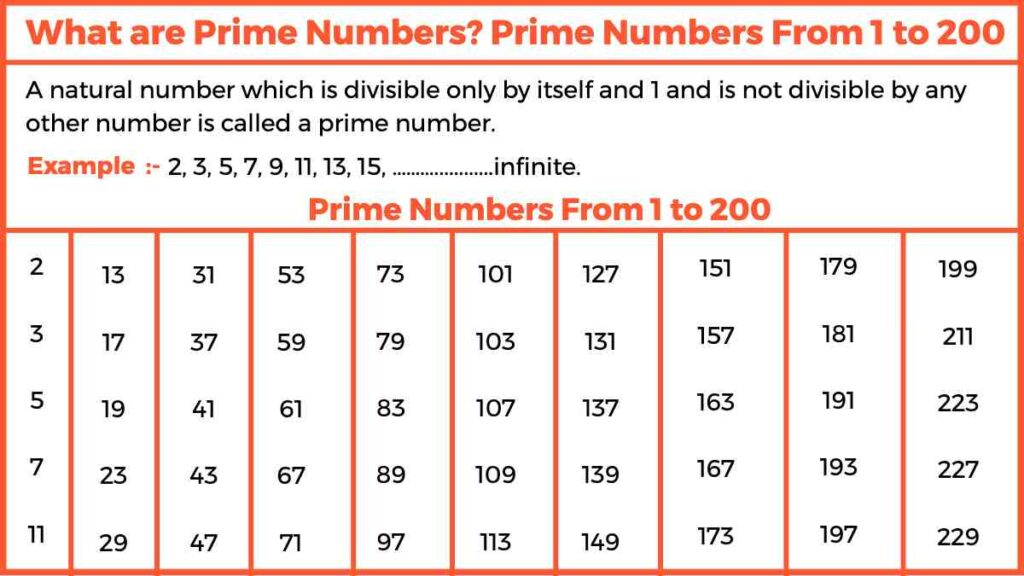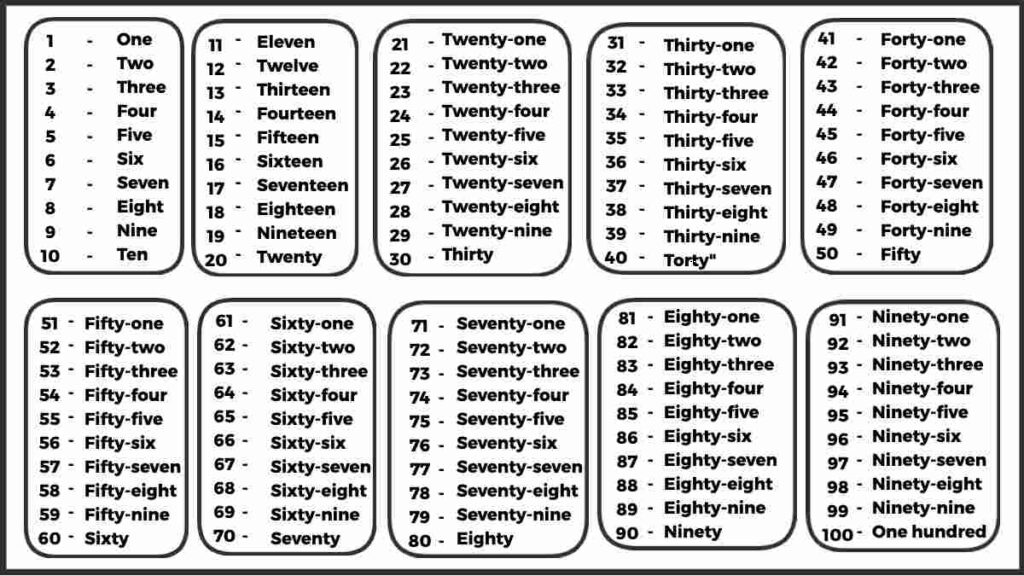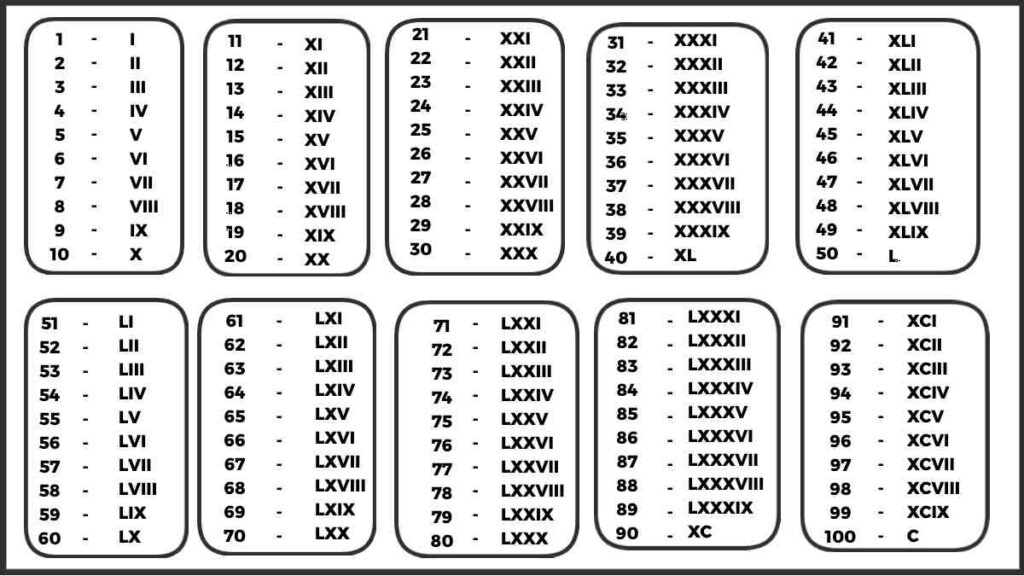If you are going to read complete information about Prime Numbers on this page, then read the article completely.
On the previous page, we have shared the information about Even Number and Odd Number, so read this post also.
Let us read and understand the information about Prime Number in today’s post.
What are Prime Number
A natural number which is divisible only by itself and 1 and is not divisible by any other number is called a prime number.
Ex :- 2, 3, 5, 7, 9, 11, 13, 15, ………infinite.
How to Find Prime Numbers
A prime number is a type of natural number or rational number that is a multiple of two or more.
Prime number can be written in the form 6n + 1 and 6n – 1.
Where, n = 1, 2, 3, 4, 5, ………………………∞
As :-
- 2 × 1 + 1 = 2
- 2 × 1 + 1 = 3
- 2 × 2 + 1 = 5
- 2 × 3 + 1 = 7
- 2 × 4 + 1 = 9
- 2 × 5 + 1 = 11
- 2 × 6 + 1 = 13
- 2 × 7 + 1 = 15
By dividing a number in 2, 3, 4, 5, 6, 7, 8, ……………, let us see which number gets divided completely.
- The number 2 is divisible by 1 and 2.
- The number 3 is divisible by 1 and 3.
- The number 4 is divisible by 1, 2 and 4.
- The number 5 is divisible by 1 and 5.
- The number 6 is divisible by 1, 2, 3 and 6.
Out of these, 2, 3, 5 are prime number. Because it is not completely divisible by anything other than one and itself.
Prime Numbers From 1 to 200
| 2 | 31 | 73 | 127 | 179 |
| 3 | 37 | 79 | 131 | 181 |
| 5 | 41 | 83 | 137 | 191 |
| 7 | 43 | 89 | 139 | 193 |
| 11 | 47 | 97 | 149 | 197 |
| 13 | 53 | 101 | 151 | 199 |
| 17 | 59 | 103 | 157 | 211 |
| 19 | 61 | 107 | 163 | 223 |
| 23 | 67 | 109 | 167 | 227 |
| 29 | 71 | 113 | 173 | 229 |
Properties of Prime Numbers
- 0 and 1 are not prime numbers.
- All prime numbers except 2 are odd.
- 1 Large whole numbers are called prime numbers.
- Prime numbers have only and only two factors.
- The method of finding prime numbers is called factorization method.
- Prime numbers are always greater than 0 and 1.
- All prime numbers greater than 1 are divisible by 1.
- A prime number cannot be divided by any number other than 1 and itself.
Prime Numbers Questions and Solutions
Question 1. What is the smallest prime number?
A. 1
B. 0
C. 2
D. 4
Answer :- The smallest prime number is 2.
Question 2. Write the smallest prime number which is greater than 9.
A. 11
B. 13
C. 17
D. 23
Answer :- The prime numbers greater than 9 are 11, 13, 17, 19, 23. The smallest number among these is 11.
Question 3. Write the largest prime number which is less than 18.
A. 17
B. 15
C. 13
D. 9
Answer :- The prime numbers less than 18 are 2, 3, 5, 7, 11, 13, 17. The largest number among them is 17.
Question 4. Write the pairs of prime number less than 20 whose difference is 2.
A. (3, 5), (5, 7), (11, 13), (17, 19)
B. (2, 3), (5, 9), (7, 9) (9, 11)
C. (1, 3), (5, 7), (7, 9) (19, 19)
D. (3, 5), (5, 7), (7, 9) (17, 19)
Solution :- According to the question,
Prime numbers less than 20 – 2, 3, 5, 7, 11, 13, 17, 19
difference of 2 between prime numbers less than 20
Answer : (3, 5), (5, 7), (11, 13), (17, 19)
Question 5. Write such pairs of prime number less than 50 whose difference is 1.
A. (2, 3)
B. (3, 5)
C. (11, 13)
D. (17, 19)
prime numbers less than 50
Answer :- 2, 3, 5, 7, 11, 13, 17, 19, 23, 29, 31, 37, 41, 43, 47
Difference of 1 between prime numbers less than 50 (3 – 2 ) = 1
Question 6. Write the prime number between 30 and 40?
A.1
B.2
C.3
D.4
Answer :- The prime numbers between 30 and 40 are – 31, 37.
Question 7. What is the number of prime number less than 50?
A.12
B.13
C.14
D.15
prime numbers less than 50
Answer :- 2, 3, 5, 7, 11, 13, 17, 19, 23, 29, 31, 37, 41, 43, 47,
Question 8. What is the number of all one digit composite numbers?
A.5
B.4
C.6
D.8
All 1 digit composite numbers
Answer :- 2, 3, 5, 7 are.
Question 9. How many prime number are there between 1 and 100?
A.12
B.24
C.25
D.30
Answer :- There are 25 prime numbers between 1 to 100.
Question 10. What is the sum of first 4 prime number?
A.15
B.17
C.23
D.29
Solution :- According to the question,
First 4 prime number = 2, 3, 5, 7,
Sum of first 4 prime number = 2 + 3 + 5 + 7
Answer :- 17
Question 11. What will be the average of 1, 3, 5, 7, 9, 11, 13, and 15?
A.8
B.10
C.12
D.15
Solution :- According to the question,
n = 15
Average of consecutive natural odd number up to n = (n + 1)/2
= (15 + 1)/2
= 16/2
Answer :- 8
Question 12. What is the average of 8 prime number?
A.4.890
B.8.984
C.9.625
D.10.789
Solution :- According to question,
The first 8 prime number are 2, 3, 5, 7, 11, 13, 17, 19.
Average = (2+3+5+7+11+13+17+19) / 8
= 77 / 8
Answer :- 9.625
Question 13. The sum of 10 consecutive prime number is?
A.112
B.137
C.129
D.142
Solution:- According to the question,
20 consecutive prime number : 2, 3, 5, 7, 11, 13, 17, 19, 23, 29
Sum of 20 consecutive prime number = 2 + 3 + 5 + 7 + 11 + 13 + 17 + 19 + 23 + 29
Answer:- 129
Question 14. The sum of 15 consecutive prime number is?
A.204
B.280
C.304
D.384
Solution:- According to the question,
25 consecutive prime number : 2, 3, 5, 7, 11, 13, 17, 19, 23, 29, 31, 33, 35, 37, 39
Sum of 20 consecutive prime number = 2 + 3 + 5 + 7 + 11 + 13 + 17 + 19 + 23 + 29 + 31 + 33 + 35 + 37 + 39
Answer:- 304
Prime Numbers FAQ
Ans. The prime numbers from 1 to 100 are: 2, 3, 5, 7, 11, 13, 17, 19, 23, 29, 31, 37, 41, 43, 47, 53, 59, 61, 67, 71, 73, 79, 83, 89, 97.
Ans. The prime numbers list up to 100 is as follows: 2, 3, 5, 7, 11, 13, 17, 19, 23, 29, 31, 37, 41, 43, 47, 53, 59, 61, 67, 71, 73, 79, 83, 89, 97.
Ans. No, 12 is not a prime number. The number 12 is divisible by 1, 2, 3, 4, 6, 12. For a number to be classified as a prime number, it should have exactly two factors. Since 12 has more than two factors, i.e. 1, 2, 3, 4, 6, 12, it is not a prime number.
Ans. Is 69 a prime number? 69 is not a prime number but a composite number.
Ans. Prime numbers are numbers that have only 2 factors: 1 and themselves.
For Example, the first 5 prime numbers are 2, 3, 5, 7, and 11. By contrast, numbers with more than 2 factors are call composite numbers.
Ans. First Pair of Twin Prime Numbers
2, 3, 5, 7, 11, 13, 17, 19, … Note that (2, 3) is not a twin prime pair since there is no composite number between them. Thus, the first pair of prime numbers to satisfy the main condition of twin prime numbers is (3, 5). The difference between 3 and 5 is two.
Ans. No, 9 is not a prime number. The number 9 is divisible by 1, 3, 9. For a number to be classified as a prime number, it should have exactly two factors. Since 9 has more than two factors, i.e. 1, 3, 9, it is not a prime number.
Hope you have liked the information about Prime Number.
Comment for any Question Related to Prime Number.


